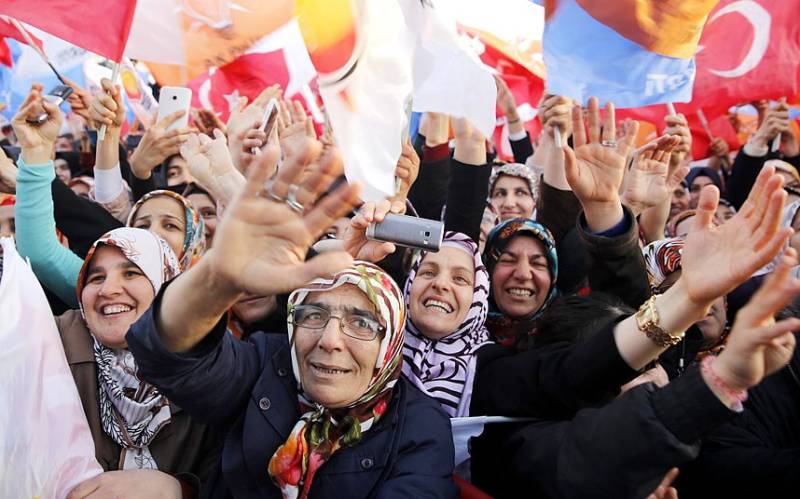The idea, “democracy is the best revenge”, has recently resonated in Turkish politics when the Justice and Development Party (AKP) has lost majority in parliamentary elections held on June 7. Though it remains the largest party in the Türkiye Büyük Millet Meclisi (Grand National Assembly of Turkey), it has to form a coalition government- a prospect, which is reminiscent of political instability and economic crisis in the country’s history. The AKP has managed to get 41 percent of the vote with the secular-nationalist Republican People’s Party (CHP) trailing behind at 25 percent. The right-wing Nationalist Movement Party (MHP) could garner 17 percent and the pro-Kurdish People’s Democratic Party (HDP) has resounding success crossing the threshold of minimum 10 percent vote. The HDP’s success has wrestled eighty seats for the party in parliament while the share of AKP has been curtailed to 258, 18 short of simple majority. The loss of AKP is meaningful, as it has put the kibosh on Erdogan’s plan of amending the Constitution to vest the presently ceremonial figure of President with executive powers. The coalition government, if formed, is likely to reintroduce the element of instability in Turkey’s politics and, therefore, political observers ponder over the possibility of another election to seek a clear mandate.
Undoubtedly, the recent election was a referendum on AKP’s policies and the gains made by the HDP are a consequence of the alienation of certain sections of the population by President Erdogan, who effectively pulls the strings. In 2013, the people came out on the streets in Istanbul to protest against the government’s arbitrary decision to convert a park into a shopping mall, without consulting the environmental stakeholders. The ensuing police crackdown unleashed by Erdogan’s government resulted in the killing of eight people while as many thousands were injured in protests countrywide. The crushing of dissent by ruthless use of force delegitimized the government, yet it dug its heals in and went ahead with its repressive policies.
The AKP on various occasions resorted to blocking social media. A couple of years ago, the access to social media sites was restricted when revelations were made of the corruption within the inner circle of Erdogan, then Prime Minister. In December last year, the AKP government launched a crackdown against journalists who were critical of government’s policies and were considered as linked with Fatehullah Gullen. The slide towards authoritarianism went a long way to discredit the democratic credentials of the Erdogan regime that had popular support as its mainstay due to its economic performance and political stability.
The HDP has its roots in Kurdish movement but presently it has adopted a broader agenda defending the rights of ethnic minorities, women, and lesbian, gay, bisexual and transgender people. In these elections, the party has successfully roped in the secular voters, who took pride in the Kemalist ethos, now under attack from Erdogan’s Islamist policies. The divisive rhetoric employed by the AKP leader in a bid to protect his religious and nationalist support base, led to polarization in Turkish society and has backfired. Voters have hailed the HDP’s inclusive approach, embracing all faiths and ethnicities, as an alternative to the exclusionary approach of the ruling party. A major chunk of support of the HDP has come in the form of protest vote as the people wanted to deny the AKP any opportunity to cement the monopolization of power. Erdogan also made use of the courts, having sued hundreds of people since coming to office, including a political cartoonist who drew him as a cat.
The President’s act of moving to a new mega presidential palace, with 1000 rooms and worth above $ 600 million, amply demonstrated his fondness for ostentatious lifestyle which also caused a resentment among the ordinary Turkish citizens. Erdogan’s dictatorial approach and defiance in face of every political confrontation, ranging from protests against demolition of park to widespread criticism against press censorship, made him popular among the conservative section of population but was perceived as a serious blow to the values of pluralism.
For all its imperfections, a democratic system allows the electorate to vote the rulers out of power if the latter don’t come up to their expectations. The possibility a person, though elected democratically, to fall to the temptation of assuming autocratic tendencies cannot be ruled out. The heady effects of Erdogan’s victory in every contest since his election as Mayor led him to disregard the limits of the possible. Thus the benevolence of precarious human nature cannot be relied upon and, instead, the institutional checks and balances only provide a safeguard for individual liberties in any system.






